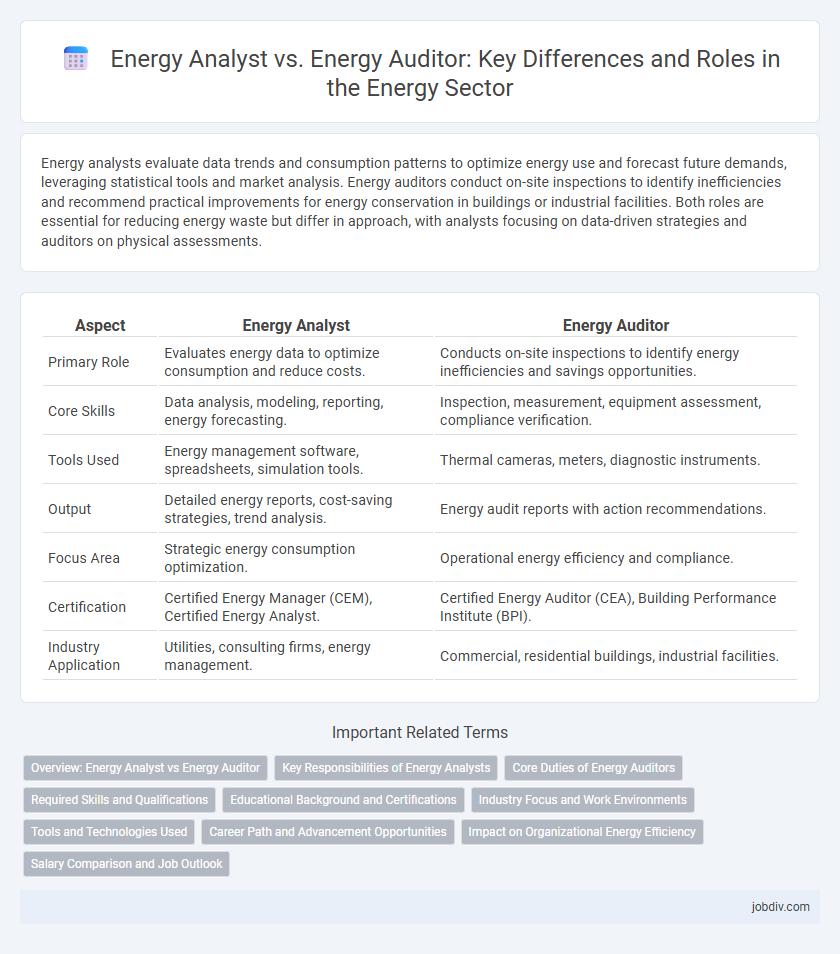Energy analysts evaluate data trends and consumption patterns to optimize energy use and forecast future demands, leveraging statistical tools and market analysis. Energy auditors conduct on-site inspections to identify inefficiencies and recommend practical improvements for energy conservation in buildings or industrial facilities. Both roles are essential for reducing energy waste but differ in approach, with analysts focusing on data-driven strategies and auditors on physical assessments.
Table of Comparison
| Aspect | Energy Analyst | Energy Auditor |
|---|---|---|
| Primary Role | Evaluates energy data to optimize consumption and reduce costs. | Conducts on-site inspections to identify energy inefficiencies and savings opportunities. |
| Core Skills | Data analysis, modeling, reporting, energy forecasting. | Inspection, measurement, equipment assessment, compliance verification. |
| Tools Used | Energy management software, spreadsheets, simulation tools. | Thermal cameras, meters, diagnostic instruments. |
| Output | Detailed energy reports, cost-saving strategies, trend analysis. | Energy audit reports with action recommendations. |
| Focus Area | Strategic energy consumption optimization. | Operational energy efficiency and compliance. |
| Certification | Certified Energy Manager (CEM), Certified Energy Analyst. | Certified Energy Auditor (CEA), Building Performance Institute (BPI). |
| Industry Application | Utilities, consulting firms, energy management. | Commercial, residential buildings, industrial facilities. |
Overview: Energy Analyst vs Energy Auditor
Energy Analysts specialize in examining energy consumption data and market trends to optimize energy use and reduce costs for organizations. Energy Auditors conduct on-site inspections and assessments, identifying inefficiencies in energy systems and recommending specific improvements for building performance. Both roles aim to enhance energy efficiency but differ in approach, with analysts focusing on data-driven strategies and auditors emphasizing practical, hands-on evaluations.
Key Responsibilities of Energy Analysts
Energy Analysts evaluate energy consumption patterns and forecast future energy needs to optimize efficiency and reduce costs. They analyze data from energy systems, monitor utility rates, and assess the impact of energy policies on operational performance. Their role involves developing energy models, preparing detailed reports, and recommending strategies to improve energy usage and sustainability.
Core Duties of Energy Auditors
Energy auditors primarily focus on conducting detailed assessments of energy use in buildings and facilities, identifying inefficiencies through on-site inspections and data analysis. Their core duties include performing energy audits, recommending energy-saving measures, and preparing detailed reports on findings to guide retrofit projects. Energy auditors play a crucial role in improving energy efficiency by evaluating HVAC systems, insulation, lighting, and equipment performance to reduce consumption and costs.
Required Skills and Qualifications
Energy Analysts require strong analytical skills, proficiency in data modeling, and expertise in energy market trends to forecast consumption and optimize energy strategies. Energy Auditors need hands-on experience with building systems, knowledge of energy efficiency technologies, and certifications such as Certified Energy Auditor (CEA) to conduct detailed energy assessments. Both roles demand a solid understanding of energy regulations, sustainability principles, and excellent problem-solving abilities.
Educational Background and Certifications
Energy Analysts typically hold degrees in engineering, environmental science, or energy management, emphasizing data analysis and system optimization; certifications such as Certified Energy Manager (CEM) or Certified Energy Auditor (CEA) enhance their credentials. Energy Auditors usually possess similar educational backgrounds but focus more on practical building systems and energy use assessments, often acquiring CEA or Building Performance Institute (BPI) certifications. Both roles demand strong technical knowledge, yet certifications tailor their expertise toward analysis or hands-on auditing practices within the energy sector.
Industry Focus and Work Environments
Energy Analysts primarily focus on evaluating energy consumption patterns and forecasting trends within sectors like manufacturing, utilities, and renewable energy industries. Energy Auditors work predominantly on-site in commercial buildings, industrial facilities, and residential properties to assess energy efficiency and compliance with regulatory standards. Both roles demand expertise in energy management, but Analysts emphasize data-driven strategy development while Auditors concentrate on hands-on inspections and recommendations for energy savings.
Tools and Technologies Used
Energy Analysts leverage advanced data analytics software, simulation tools, and building information modeling (BIM) platforms to evaluate energy consumption patterns and optimize efficiency strategies. Energy Auditors utilize diagnostic instruments such as thermal imaging cameras, blower doors, and combustion analyzers for on-site inspections to detect energy losses and assess system performance. Both professionals integrate smart metering technology and energy management systems (EMS) to provide comprehensive assessments and implement energy-saving solutions.
Career Path and Advancement Opportunities
Energy Analysts focus on interpreting data to optimize energy consumption and forecast trends, often advancing into strategic roles such as energy consultants or energy managers. Energy Auditors specialize in evaluating energy use through on-site assessments, paving the way for certification roles or consultancy positions in energy efficiency and compliance. Both career paths offer advancement opportunities in sustainability, policy development, and advanced analytics within the renewable energy sector.
Impact on Organizational Energy Efficiency
Energy Analysts enhance organizational energy efficiency by leveraging data analytics to identify consumption patterns, optimize energy use, and forecast future needs, leading to strategic energy management decisions. Energy Auditors conduct thorough on-site inspections and assessments to pinpoint inefficiencies, recommend immediate corrective actions, and ensure compliance with energy standards. Together, these roles drive measurable improvements in energy savings and reduce operational costs through data-driven insights and practical interventions.
Salary Comparison and Job Outlook
Energy Analysts typically earn between $65,000 and $90,000 annually, driven by expertise in data modeling and market trends, while Energy Auditors average salaries range from $50,000 to $75,000, reflecting their focus on on-site energy efficiency assessments. The job outlook for Energy Analysts is projected to grow 8% over the next decade due to increasing demand for renewable energy strategies, whereas Energy Auditors face a steady 5% growth linked to regulatory compliance and energy conservation initiatives. Salary potential and career advancement for Energy Analysts tend to be higher in consulting firms and utilities, contrasted with Energy Auditors who often find opportunities in residential and commercial energy services.
Energy Analyst vs Energy Auditor Infographic

 jobdiv.com
jobdiv.com